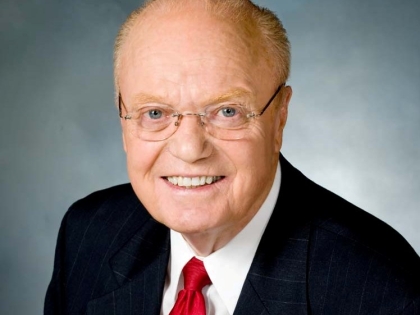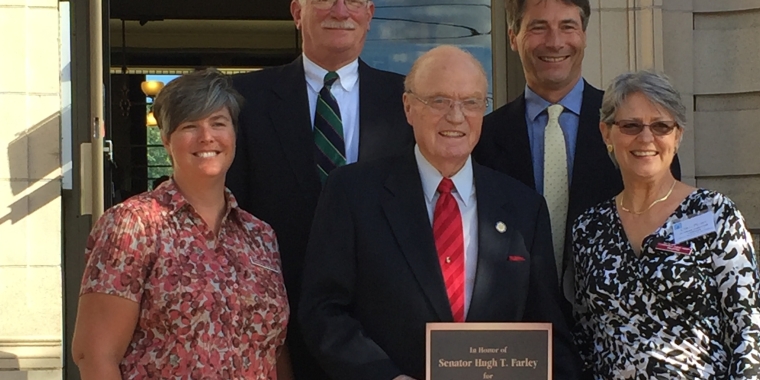
Sen. Farley Reports Some Key Priorities Achieved in 2014-15 State Budget
Hugh T. Farley
March 31, 2014
-
ISSUE:
- Budget
State Senator Hugh T. Farley (R, C, I – Schenectady) announced the agreed-on 2014-15 state budget includes some key priorities goals of his and his fellow Senate Republican Conference, including: more than $1 billion in additional aid to schools that is distributed fairly across the state; additional property relief for hardworking families; tax cuts to help businesses create new job opportunities; and comprehensive ethics and election reforms.
Highlights of the 2014-15 State Budget include:
$1.5 Billion in New Property Tax Relief
Senate Republicans have a long history of fighting for property tax relief for hardworking homeowners. They created the original STAR school property tax relief program, fought for creation of the two-percent property tax cap, and initiated the STAR rebate check program, which was eliminated by Senate Democrats in 2009.
The 2014-15 State Budget will include a new property tax relief program that will provide taxpayers with $1.5 billion in direct property tax relief over the next three years for taxpayers in school and municipalities that develop plans to reduce costs and increase efficiencies, or have already implemented cost reduction plans at the local level.
As many as 2.8 million property taxpayers could receive direct property tax rebates as a result of this program which will encourage communities to keep property taxes under control.
$1.1 billion increase in school aid
GEA --The billion dollar increase in school aid will help ensure a quality education for every child. The aid will be distributed fairly and equitably across New York and will address the negative impact of the Gap Elimination Adjustment (GEA) on school districts.
The GEA was an unfair school aid cut, enacted in 2010 by the Democrats who controlled the Senate, Assembly and Governor's Office. The entire Senate Republican Conference voted against the GEA measure at that time. Since its inception, the GEA has cost school districts across the state billions of dollars in reduced state aid.
Senate Republicans have been leading the charge to abolish the GEA. The significant school funding increase in this budget is a major leap towards undoing the damage caused by the Senate Democrats.
Common Core Delay -- The budget includes a two-year delay on the use of the controversial common core testing for grade promotion decisions for children from third to eighth grades and measures to eliminate unnecessary standardized testing to focus more classroom time on teaching, rather than testing.
The budget also includes strict data protection provisions to protect student privacy. The test results would still be used for teacher evaluations.
Pre-K Funding -- In addition, the budget includes $1.5 billion over the next five years for statewide funding of Pre-Kindergarten programs. Aid will also be provided to districts Upstate and on Long Island, along with the flexibility to use it either for early education programs or additional GEA restoration.
Charter Schools -- The new state budget increases state tuition aid for charter schools over the next three years. Charter schools will receive an increase of $250 per pupil this year, $350 in the second year, and $500 in the third. Charter schools will also be eligible for Pre-K funds. The budget also recognizes that local districts will be held harmless from any additional costs associated with charters in their communities.
Technology Bond Act – Voters will decide this fall on a proposed $2 billion bond act to fund technological improvements in schools including broad band expansion and new technology for student use in classrooms.
Tax cuts to create new jobs
The budget will include job-creating tax cut proposals that were outlined by Senate Republicans last fall, including:
-- Eliminating the corporate tax on manufacturers this year;
-- Creating real property tax credit of 20 percent for manufacturers that lease or own property;
-- Accelerating the elimination of the 18-a energy tax surcharge to save all business and residential ratepayers $600 million over the next three years; and
-- Increasing the estate tax exemption over the next five years from $1 million to match the federal exemption of $5 million. Starting in 2019, the threshold would be indexed to the federal threshold and indexed to inflation. This important change will help maintain family-owned businesses and encourage farm preservation from generation to generation.
These tax relief measures will help small businesses and manufacturers succeed, grow and help create new job opportunities for every New Yorker.
Ethics Reforms
The budget includes sweeping ethics reform measures to ensure the public’s trust in government including the following:
-- Creating the new crime of Corrupting the Government and increasing penalties for bribery, and public corruptions crimes;
-- Stricter penalties for theft of state or local government property;
-- Permanently barring individuals or businesses convicted of public corruption from holding any elected or civil office, serving as a lobbyist or doing business with the state;
-- Establishing a public campaign financing pilot program, not funded by taxpayer dollars, to be used for the 2014 race for state Comptroller;
-- Creating an independent enforcement unit at the state Board of Elections; and
-- Bringing enhanced disclosure and reporting by the independent expenditure organizations that have expanded in the wake of the U.S. Supreme Court case Citizens United v. F.E.C..
Health Care
The 2014-15 State Budget addresses important health care issues facing New Yorkers by providing funding for the following initiatives and programs:
-- $1.2 billion over seven years for health care facilities restructuring, to ensure that New Yorkers continue to have access to quality health care services at hospitals, clinics and nursing homes;
-- Eliminating surprise billing for Out-Of-Network medical procedures;
--$2.5 million increase to the Doctor's Across New York Program to bring doctors to rural regions of the states to ensure access to primary care health services
-- A $5 million increase in funding for Spinal Cord Injury Research program, bringing total funding to $7.5 million;
-- $450,000 for Opioid prevention, treatment, and addiction services to address the growing problems of heroin addiction;
-- A $1.8 million increase in funding for rape crisis centers, bringing total funding to $3.6 million;
-- $3.9 million to ensure that providers of Early Intervention Services are paid; and
-- $25.3 million for cancer services programs;
-- $2.3 million for prenatal care; and
-- $433,000 for the Adelphi Breast Cancer Support program.
Expanded Prescription Drug Assistance for Seniors
The budget will expand the number of senior citizens eligible for the EPIC prescription drug program by increasing the income eligibility limits from $35,000 to $75,000 for individuals and from $50,000 to $100,000 for married enrollees.
The budget also includes a $5 million increase in funding for community services for the elderly, such as transportation assistance, respite care, and home delivery meals.
Investing in Higher Education
The 2014-15 State Budget includes a new round of economic development grants for the SUNY 2020 and CUNY 2020 programs. Each university system will receive $55 million for projects that target academic success, more job opportunities for students and new public-private partnerships.
In addition, the budget increases base aid support for community colleges by $75 for each full-time equivalent student, which represents a total increase of $15.1 million for SUNY and CUNY community colleges. Funding for tuition assistance (TAP) is increased by $34 million, to help more young New Yorkers afford the cost of a higher education.
Overall state operating support for the state’s public university systems is increased by $178 million for SUNY and $104 million for CUNY.
Improving Local Roads & Bridges
To ensure that our roads and bridges are safe, the budget includes $3.7 billion in funds for capital improvement projects. The money will be used for road and bridge projects, as well as for projects related to aviation, rail, non-MTA transit and bus services. In addition, the budget increases operating aid for transit authorities by $2.8 million.
Also, the 2014-15 State Budget continues the record increase in transportation aid for a total of $438.1 million in funds to local governments for repair and maintenance of roads through the CHIPS program. It also includes new, additional funding of $40 million to local governments to fix surface road damage and the large number of potholes created by the brutal winter.
A Cleaner Environment
In an effort to ensure that New Yorkers can enjoy clean water and clean air, the new state budget will increase the Environmental Protection Fund (EPF) by $9 million, bringing the EPF to $162 million.
In addition, the budget will make an investment of $92.5 million from the NY Works program to make much-needed repairs and improvements at state parks across the state, as well as $40 million to make additional improvements to environmental infrastructure such as wastewater systems and recreational facilities.
Human Services
Funding for child care subsidies for low income families is increased by $55 million over last year.
Fiscal Responsibility
For the fourth consecutive year the budget will reduce taxes and will keep overall spending growth below two percent – the same level imposed on local governments and school districts by the property tax cap.
Share this Article or Press Release
Newsroom
Go to NewsroomOctober is National Domestic Violence Awareness Month
October 5, 2016

October Is Breast Cancer Awareness Month
October 4, 2016

September is National Preparedness Month
September 23, 2016

Senator Farley Secures Grant for Gloversville Library
September 15, 2016
